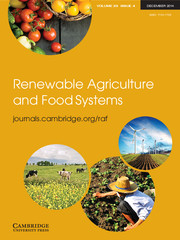Food, Farming and Faith focuses on the teachings of the Bible that describe ancient agricultural and cultural practices, with the aim to describe our agricultural history and to provide guidance for the development of more sustainable agricultural systems. In addition, the author attempts to show how the Bible's teaching can be used as a basis for overcoming other global challenges such as our expanding population, degradation of natural resources, lack of women's rights and poverty. In this modern age, we can forget the historical roots of our agricultural practices, even those of us involved with agriculture. Dr Fick's reminder serves to reconnect us, as well as encourage us to look to the past for solutions for the future.
Throughout the book, Dr Fick includes biblical passages, his interpretation of their meaning and the value the passage can have toward the development of more sustainable agricultural systems. Readers would quickly agree with most of the author's interpretations of biblical passages, given the self-explanatory nature of the passages. Dr Fick includes many passages that provide good farming advice such as planting a diversity of crops, weeding and plowing and irrigating as needed. However, the author's interpretations of a few passages are less understandable or convincing. In one case, the author gives a passage and interprets its meaning as suggesting a need for reduced tillage, although the passage itself makes no mention of needing to reduce tillage. In other cases, the actual passage is not given or cited, leaving the reader unclear on the basis of the interpretation. Such weakly supported interpretations may be off-putting to some readers. But these readers may be less likely to simply dismiss the author's arguments, due to the author's straightforward, jargon-free writing style and the inclusion of many personal farming experiences, which make the book feel more like a fireside chat than a scientific thesis. This warm, personal approach seems to both acknowledge its scientific shortcomings and point out the value of one's personal experience. This approach also may help to put the non-religious and skeptical reader more at ease and willing to listen to the well thought out perspective of the author who is clearly a very intelligent, caring and experienced agriculturalist and human being. If we can listen to and consider differing opinions, we will progress, as farmers, as humans and as a society. One cannot help but think that the relaxed atmosphere Dr Fick creates with his writing style is an intentional effort to foster this type of consideration from his readers and if so, he succeeds.
The addition of other global challenges, such as population, degradation of natural resources, lack of women's rights and poverty, helps to broaden the book's appeal and relevancy. Again, Dr Fick includes biblical passages that he feels can guide us to creating solutions to particular problems. However, as was the case with interpreting agriculturally related passages, the passages included often seem too general in their advice. In some cases, the reader could arrive at different and even opposite interpretations than those of the author, and the author seems to be well aware of this. Dr Fick presents his interpretations clearly and without dogma, which tends to provoke thought rather than blind acceptance or rejection by the reader, despite at times not having strong evidence to support his interpretations. Still, the reader may not feel convinced that the Bible's teachings are clear enough to be truly relevant or beneficial to our progress in overcoming these global challenges. In fact, it would be easy to argue that some of the Bible's teachings, on women's rights for example, are contradictory at best and counterproductive at worst. The author gives the impression of wanting the Bible to be used to a greater extent as a guidance in addressing these global concerns. However, the biblical passages given seem to be somewhat vague in their guidance and weak on detailed solutions, which is understandable given the unprecedented scale of the global challenges we face. The author gives many examples of the Bible's wisdom, and so his underlying assertion that the Bible can provide guidance cannot be quickly dismissed. However, many readers would have likely enjoyed the author's thoughts on how to apply biblical generalities to create practical solutions for our time. Still, the degree to which many of our global challenges are, to some extent, addressed in the Bible is likely to be surprising to many readers.
Dr Fick succeeds in writing a thought-provoking book that is a worthwhile read for everyone interested in sustainable agriculture and its relationship to the Bible. He reminds us of our connection to the past. His clear, warmly personal style that is free of scientific jargon, invites even the skeptic to consider his valuable perspectives as we seek solutions toward a more sustainable future.


